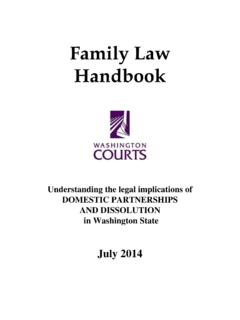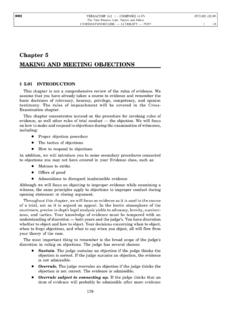Transcription of CHAPTER 5. FAMILY LAW RULES - Fresno Superior Court
1 Proposed Revisions to Fresno County Local RULES Effective July 1, 2013 1 CHAPTER 5. FAMILY LAW RULES RULE MEDIATION AND CHILD CUSTODY RECOMMENDING COUNSELING (CCRC) Purpose of Mediation and CCRC sessions (CCRCS) The purpose of Mediation and a CCRC session is to reduce acrimony which may exist between the parties and to develop a custody/visitation plan which ensures the minor child(ren) frequent and consistent contact with both parents, when in the child(ren) s best interests. (Effective July 1, 2013; Rule renumbered effective January 1, 2006; adopted as Rule effective July 1, 1999) Types of Mediation and CCRC Sessions The following services are offered by FAMILY Court Services (FCS). Mandatory confidential mediation (Tier I below) shall be made available in all cases in which child custody is at issue; the remaining services shall be scheduled as directed by the FAMILY law judicial officer in the exercise of his/her discretion according to the availability of resources and the needs of each case: A.
2 At Court CCRC Session. An at- Court session is scheduled by a judicial officer when, upon review of a parent s request for an ex parte order, the judicial officer determines that exigent circumstances exist such that an immediate hearing must be scheduled. Children who are five and older should be brought to Court for at- Court sessions. All at- Court sessions shall be child custody recommending counseling sessions; the sessions are not confidential and the counselor shall submit a report and recommendation to the Court and parties. When possible, the recommending counselor will provide a report and recommendation to the Court and parties. When possible, the recommending counselor will provide a report and recommendation on the day of the at- Court session; however, the counselor shall be provided adequate time to interview the parties and child(ren), make collateral contacts, and prepare the report and recommendation.
3 There is no charge for child custody recommending counseling for at- Court sessions, as these sessions are mandatory. Once a case has had an at- Court CCRC session, future sessions may include any of the services set forth below. B. Mandatory Confidential Mediation 1. Children shall not participate in confidential mediation unless otherwise directed by FAMILY Court Services or the Court . 2. There is no charge for mandatory confidential mediation. 3. Mandatory mediation is confidential except: Proposed Revisions to Fresno County Local RULES Effective July 1, 2013 2 a. The mediator shall report, but not comment on, the parties agreement or inability to reach an agreement to the parties and the Court . b. The mediator shall report suspected child abuse, elder abuse, and/or if someone is a danger to themselves or others.
4 4. Two types of mandatory mediation may be offered. a. Readiness Mediation: When resources allow, an initial confidential mediation session may take place at the initial readiness (scheduling) hearing. The goal of readiness mediation is to assist parents in reaching an agreement that would meet the needs of the children pending Tier I mediation and further hearing. If an agreement is not reached during readiness mediation, then the Court may make a temporary order pending Tier I mediation and further hearing. The parents may, if they wish, come to a more complete agreement during readiness mediation. b. Scheduled Mediation (Tier I): Unless custody/visitation has been resolved at the readiness hearing, parents will be given a date for confidential mediation at the readiness hearing.
5 C. Further Services Beyond Mandatory Confidential Mediation (Tiers II and III). If mandatory mediation has not resulted in an agreement, the judicial officer has discretion to refer the parties for further sessions with FAMILY Court Services as provided in this section. 1. Tier II and Tier III sessions are not confidential. Any mediator who provided confidential mediation to the parents shall not be permitted to serve as a Tier II or Tier III counselor. 2. When permitted by law or rule, fees may be charged for Tier II and Tier III. If fees are to be charged, then parents shall be informed of the fees and given an opportunity to be heard before the judicial officer refers the parents for Tier II or Tier III services. The amount ordered, if any, shall be included in the minute order.
6 The Court has jurisdiction to allocate the fees between the parties. 3. Two types of further services may be offered. a. Tier II. The purpose of Tier II sessions is to provide the Court with facts pertaining to the parents concerns, collateral contacts, etc. A report shall be provided to the Court and parties which may include, but not be limited to, a synopsis of the children s school attendance, medical issues, description of collateral contacts with law Proposed Revisions to Fresno County Local RULES Effective July 1, 2013 3 enforcement or Child Protective Services, etc. Unless otherwise directed by the Court , children shall not participate in Tier II sessions. Tier II sessions do not include the conclusions, recommendations, or opinions of the mediator. b.
7 Tier III. Tier III sessions are child custody recommending counseling (CCRC) sessions. These sessions shall result in a report and recommendation. The counselor s recommendation shall be made available to the parties, at the FCS office, two (2) Court days before the Court hearing. If the recommendation is not available before the hearing, it shall be available in Court at the time of the hearing. The counselor s report will be provided to the parties at the time of the hearing. Children who are five and older shall participate in Tier III sessions. D. FAMILY Code 3111 Custody Evaluation: Custody evaluations will only be ordered by the Court in the event all other services have been insufficient to develop a long term custody order. 1. Evaluators: The custody evaluator shall be mutually agreed upon by the parties or selected by the judicial officer if the parties are unable to reach an agreement.
8 The custody evaluation may be completed by a FCS staff member or by a private psychologist who has been approved by the Court . 2. Fees. A fee will be charged for a custody evaluation. A substantial deposit may be required before the evaluation can commence and full payment may be required before the custody evaluation report is submitted to the Court for consideration. 3. Time Period. The custody evaluation shall be completed within the time period set forth by the Court . In the event a child custody evaluation is not completed within the time set forth by the Court , the referral may be terminated and the current orders regarding custody and visitation shall remain in full force and effect until further order of the Court . 4. Participation. If the Court receives a custody evaluation where only one party participates and the other party does not complete the evaluation, the completed portion of the evaluation may be considered by the Court .
9 (Effective July 1, 2013; Rule renumbered effective January 1, 2006; adopted as Rule effective July 1, 1999) Attendance at FCS Appointments A. Telephonic Participation: The request for telephonic participation shall be made a minimum of seven (7) calendar days in advance of the mediation or CCRC appointment. A party may participate in their mediation or CCRC appointment via telephone when any one of the following occurs: Proposed Revisions to Fresno County Local RULES Effective July 1, 2013 4 1. The party resides beyond a 250-mile radius from the Sisk Fresno Superior Court building; 2. Traveling to the FCS facility will cause an extreme hardship; 3. Telephonic participation is directly ordered by the Court ; 4. When there is good cause, at the discretion of FCS. B. Rescheduling FCS Appointments: All mediation and CCRC appointments will be scheduled by the Court ; thus, FCS is unable to reschedule without a modified order from the Court .
10 C. Cancellation of FCS Appointments: Both parties will need to contact FCS to cancel a mediation or CCRC appointment. Once FCS has received confirmation of the cancellation request from both parties, the appointment with FCS will be cancelled. Note: This will NOT cancel any upcoming Court hearings. (Effective July 1, 2013; Rule renumbered effective January 1, 2006; adopted as Rule effective July 1, 1998) Availability of FCS Mediators/CCRC Counselors for Testimony A. Mediator Testimony. Because mediation is a confidential process, the mediator facilitating a confidential mediation cannot be called to testify regarding the information that is shared by the parties during the mediation session. B. CCRC Counselor Testimony: 1. On-Call: Unless otherwise directed by the Court , the CCRC counselor will be on call rather than personally present in the courtroom.
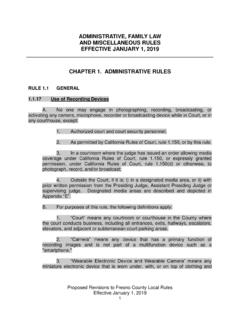
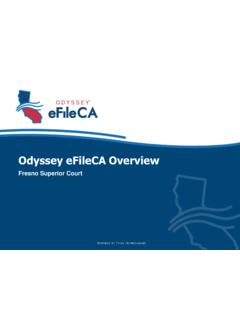
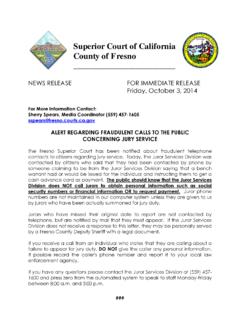
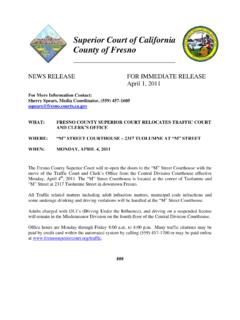

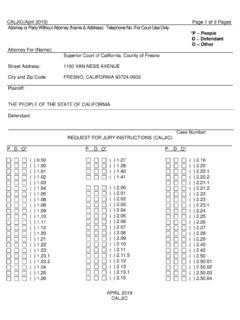
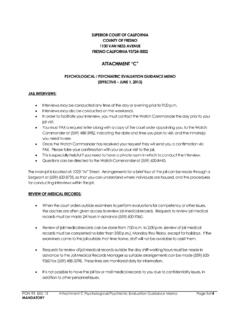
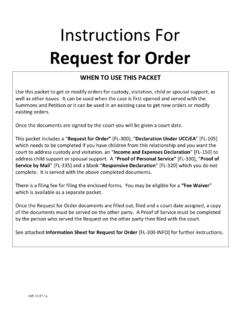
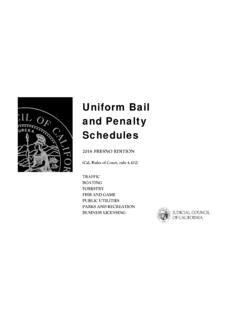

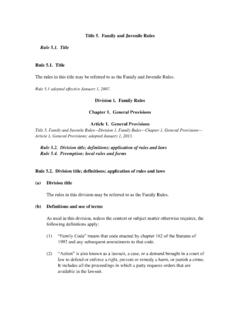
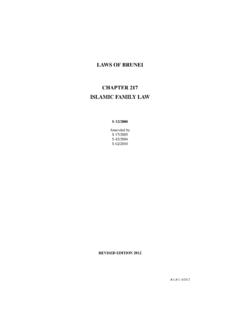
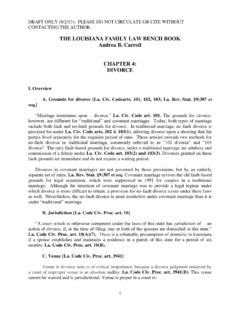
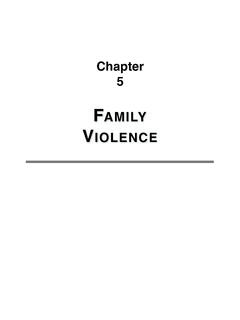
![CHAPTER 5 - [OFFENSES] - indianlaw.mt.gov](/cache/preview/a/f/b/0/c/0/0/b/thumb-afb0c00bde8407c6a9ae0a4fc2364016.jpg)

